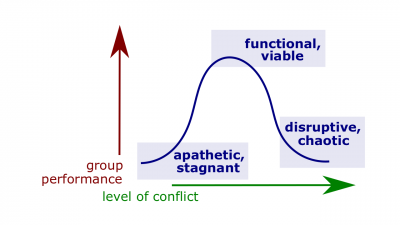Difference between revisions of "Conflict"
MariamKhalid (talk | contribs) |
|||
| Line 8: | Line 8: | ||
According to [[Management by Robbins and Coulter (14th edition)]], | According to [[Management by Robbins and Coulter (14th edition)]], | ||
:[[Conflict]]. Perceived incompatible differences that result in interference or opposition. | :[[Conflict]]. Perceived incompatible differences that result in interference or opposition. | ||
| + | According to [[Looking Out, Looking In by Adler, Proctor (15th edition)]], | ||
| + | :[[Conflict]]. An expressed struggle between at least two interdependent parties who perceive incompatible goals, scarce resources, and interference from the other party in achieving their goals. | ||
==Views of conflict== | ==Views of conflict== | ||
| Line 17: | Line 19: | ||
*[[Social Rationale Quarter]]. | *[[Social Rationale Quarter]]. | ||
| − | [[Category:Management]][[Category: Septem Artes Administrativi]][[Category: Articles]] | + | [[Category:Management]][[Category: Septem Artes Administrativi]][[Category: Articles]][[Category: Human Communications]] |
Revision as of 16:23, 10 July 2020
Conflict can refer to one or more of the following:
- Perceived incompatible differences that result in interference or opposition;
- A process that begins when one party perceives that another party has negatively affected, or is about to negatively affect, something that the first party cares about.
Definitions
According to Organizational Behavior by Robbins and Judge (17th edition),
- Conflict. A process that begins when one party perceives that another party has negatively affected, or is about to negatively affect, something that the first party cares about.
According to Management by Robbins and Coulter (14th edition),
- Conflict. Perceived incompatible differences that result in interference or opposition.
According to Looking Out, Looking In by Adler, Proctor (15th edition),
- Conflict. An expressed struggle between at least two interdependent parties who perceive incompatible goals, scarce resources, and interference from the other party in achieving their goals.
Views of conflict
- Traditional view of conflict. The view that all conflict is bad and must be avoided.
- Human relations view of conflict. The view that conflict is a natural and inevitable outcome in any group.
- Interactionist view of conflict. The view that some conflict is necessary for a group to perform effectively.
